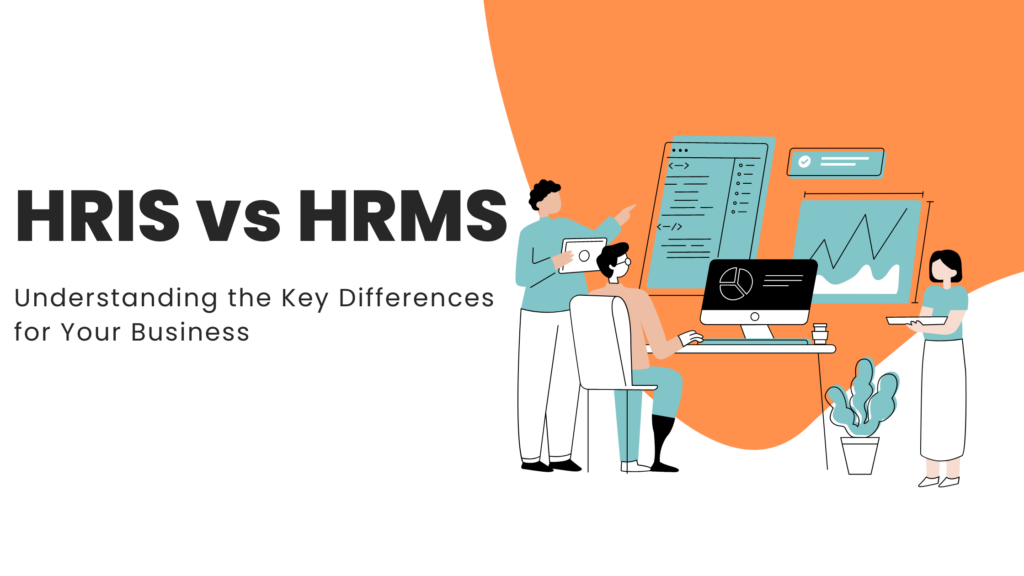HRIS vs HRMS: Understanding the Key Differences for Your Business

In today’s fast-paced business environment, managing human resources effectively is crucial for any organization’s success. Two commonly used systems, HRIS (Human Resource Information System) and HRMS (Human Resource Management System), are often discussed interchangeably, but they differ significantly in their capabilities and applications. Knowing these differences can help businesses make informed decisions when choosing the right HR software solution to streamline processes and enhance workforce management.
What is an HRIS?
An HRIS primarily focuses on the administrative side of human resource management. It’s a technology that allows organizations to handle core HR functions, such as employee data management, payroll processing, compliance tracking, and basic reporting. The main purpose of an HRIS is to digitize and automate administrative HR tasks that would otherwise be done manually, saving time and reducing human error.
Key Features of an HRIS
- Employee Data Management: An HRIS allows organizations to store, manage, and access employee information such as contact details, job titles, salary, and performance reviews. It serves as a centralized database for all personnel records.
- Payroll and Benefits Management: Most HRIS systems are equipped with payroll processing tools that integrate with employee data to ensure timely and accurate payments. Benefits management tools are often included, allowing employees to manage their health plans, retirement options, and other perks.
- Compliance Management: The system ensures that the company adheres to government regulations and labor laws by automatically tracking and updating compliance-related information.
- Reporting and Analytics: An HRIS provides basic analytics and reporting features that enable HR teams to generate reports on workforce metrics, turnover rates, and compliance audits.
What is an HRMS?
An HRMS is a more comprehensive system that encompasses all the functionalities of an HRIS but also includes advanced modules that support the broader scope of human resource management. In addition to data storage and payroll management, an HRMS also handles performance management, recruitment, talent management, learning and development, and more. It is a complete solution designed to support both the administrative and strategic aspects of HR management.
Key Features of an HRMS
- Talent Management: An HRMS allows HR teams to manage the full employee lifecycle, from recruitment to onboarding, talent development, and succession planning. With features like applicant tracking systems (ATS), it streamlines the hiring process and ensures the best candidates are recruited.
- Performance Management: With integrated performance evaluation tools, HRMS enables organizations to set goals, track employee performance, and conduct regular performance reviews.
- Learning and Development: Most HRMS platforms offer training modules, allowing companies to provide online learning opportunities for employees to develop their skills and stay updated with industry standards.
- Workforce Planning: HRMS systems provide advanced analytics tools for workforce planning, helping HR leaders make strategic decisions about hiring, staffing, and employee retention.
Comparing HRIS and HRMS: Which is Right for Your Business?
Choosing between an HRIS and HRMS depends largely on the specific needs of your organization. While both systems offer significant value, they cater to different aspects of human resource management.
Functionality
- An HRIS is perfect for businesses that are primarily concerned with automating their HR administration processes. It offers essential tools like employee data management, payroll, benefits administration, and compliance tracking.
- An HRMS provides a more holistic approach to HR, offering strategic tools that assist in talent acquisition, performance management, and long-term workforce planning.
Company Size and Needs
- Smaller companies with fewer employees might benefit more from an HRIS, as they typically do not require the advanced tools of an HRMS. For these organizations, the main focus is on keeping HR processes efficient and compliant.
- Larger companies or those with more complex HR needs might prefer the robust features of an HRMS, which can handle a higher volume of employee data and offer strategic tools to enhance talent management and workforce optimization.
Cost
- An HRIS tends to be more cost-effective, especially for small to medium-sized businesses, due to its focus on core administrative features.
- An HRMS, with its wider range of functionalities, is typically more expensive but provides better value for businesses looking to integrate strategic HR functions with everyday administrative tasks.
Customization and Scalability
- HRMS systems are generally more customizable and scalable than HRIS solutions. As companies grow, the need for advanced features like performance management and employee development becomes more crucial.
- HRMS platforms allow businesses to add or modify functionalities based on their evolving needs, whereas HRIS systems are often more rigid and limited in their customization options.
HRIS vs HRMS: The Role of Integration and Cloud-Based Solutions
Both HRIS and HRMS platforms have evolved significantly over the years, thanks to advancements in cloud-based technology. Many modern HR systems now offer SaaS (Software as a Service) solutions, which allow companies to access their HR tools via the cloud. These cloud-based solutions offer numerous advantages over traditional on-premise systems, including lower upfront costs, easier updates, and remote accessibility.
Integration Capabilities
- HRIS systems, while effective in managing core HR functions, may lack the advanced integration features that connect HR with other business processes like finance, project management, and customer relationship management (CRM).
- HRMS platforms are designed to integrate seamlessly with other enterprise systems, enabling businesses to create a more unified operational infrastructure.
Conclusion: HRIS or HRMS—Which is Best for Your Business?
In summary, both HRIS and HRMS systems offer valuable solutions to help businesses manage their workforce more effectively. If your company is primarily looking to streamline administrative HR functions like payroll and compliance, an HRIS may be the right choice. However, if you need a more comprehensive solution that supports long-term workforce planning, talent management, and employee development, an HRMS would be the better option.
Ultimately, the decision between an HRIS and an HRMS will depend on your organization’s size, complexity, and future growth plans. Whichever system you choose, implementing the right HR technology can drive efficiency, boost employee satisfaction, and give your business a competitive edge.